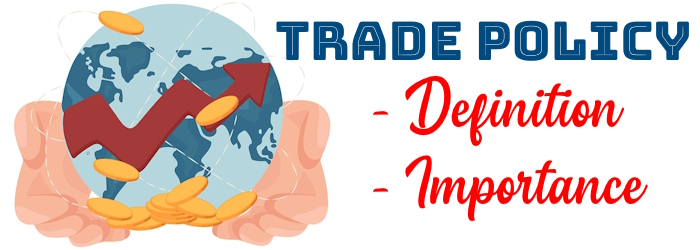Trade Policy | Definition | Importance in International Trade
Trade policy plays a crucial role in shaping the international trade landscape. It refers to a set of rules, regulations, and measures implemented by governments to govern and facilitate the flow of goods and services across national borders. This article explores the definition of trade policy and delves into its significance in fostering economic growth, promoting international trade, and addressing various challenges and opportunities in the global marketplace.

Table of Contents
- 1 Definition of Trade Policy
- 2 Importance of Trade Policy in International Trade:
- 2.1 Economic Growth and Development:
- 2.2 Market Access and Competitiveness:
- 2.3 Addressing Trade Imbalances:
- 2.4 Facilitating Foreign Direct Investment (FDI):
- 2.5 Harmonizing International Standards:
- 2.6 Mitigating Economic Risks:
- 2.7 Promoting Sustainable Development:
- 2.8 Fostering Innovation and Technological Progress:
- 2.9 Promoting Regional Integration and Cooperation:
- 2.10 Enhancing Diplomatic Relations and Peace:
- 3 Conclusion
Definition of Trade Policy
Trade policy encompasses the measures and strategies adopted by governments to regulate international trade activities. It includes policies related to tariffs, quotas, subsidies, trade agreements, customs regulations, and other trade-related aspects. The primary goal of trade policy is to achieve favorable economic outcomes by balancing domestic priorities and international trade objectives.
Importance of Trade Policy in International Trade:
Trade policy is of utmost importance in international trade as it drives economic growth, facilitates market access, addresses trade imbalances, attracts foreign investment, promotes harmonization and cooperation, mitigates risks, fosters sustainable development, encourages innovation, and enhances diplomatic relations. By creating a favorable environment for trade, countries can maximize their potential, optimize resource allocation, and promote mutually beneficial relationships with trading partners, ultimately contributing to global economic prosperity and stability.
Economic Growth and Development:
Trade policy plays a vital role in promoting economic growth and development. By facilitating trade and ensuring a conducive business environment, countries can leverage their comparative advantages and stimulate economic activities. Trade policies that promote openness, reduce trade barriers, and encourage foreign investment contribute to expanding markets, boosting productivity, creating jobs, and attracting capital inflows.
Market Access and Competitiveness:
Trade policies shape market access conditions for domestic industries in foreign markets. Through negotiations, tariff reductions, and removal of non-tariff barriers, trade policies enhance the opportunities for businesses to reach larger customer bases and expand their market share globally. By fostering competition, trade policies encourage domestic industries to improve efficiency, innovate, and enhance their competitiveness on the international stage.
Addressing Trade Imbalances:
Trade policies are instrumental in addressing trade imbalances between countries. Governments can employ various measures, such as tariffs, quotas, and currency exchange rate policies, to correct trade deficits or surpluses. Trade policy tools allow countries to protect specific industries, promote exports, or manage imports strategically, aiming to achieve a more balanced trade relationship with trading partners.
Facilitating Foreign Direct Investment (FDI):
Trade policies are closely linked to attracting foreign direct investment (FDI). Countries with favorable trade policies, including investment protection, intellectual property rights enforcement, and transparent regulations, tend to attract higher levels of FDI. FDI brings in capital, technology transfer, job creation, and knowledge spillover, which contribute to economic development and enhance a country’s global competitiveness.
Harmonizing International Standards:
Trade policies play a vital role in harmonizing international standards and regulations. Through bilateral and multilateral trade agreements, countries collaborate to establish common frameworks for product standards, sanitary and phytosanitary measures, intellectual property rights, and environmental regulations. Harmonization of standards reduces trade barriers, promotes efficiency, ensures consumer protection, and facilitates smoother trade flows.
Mitigating Economic Risks:
Trade policies serve as a tool for mitigating economic risks and uncertainties. Governments can implement policies to protect domestic industries from unfair trade practices, such as anti-dumping measures or safeguard mechanisms. These policies safeguard domestic producers from sudden surges in imports that could harm their competitiveness or threaten their survival. Trade policies also enable countries to diversify their trade partners and reduce dependence on a limited number of markets, minimizing vulnerability to external shocks.
Promoting Sustainable Development:
Trade policies increasingly focus on promoting sustainable development. Environmental standards, labor rights, and social welfare considerations are integrated into trade agreements and policies. By ensuring that trade is conducted in an environmentally friendly and socially responsible manner, countries can align economic growth with social and environmental objectives, contributing to sustainable development on a global scale.
Fostering Innovation and Technological Progress:
Trade policies play a key role in fostering innovation and technological progress. By promoting openness and facilitating the exchange of goods, services, and ideas, trade policies encourage cross-border collaboration and knowledge sharing. This exchange of information and technologies between countries stimulates innovation, enhances productivity, and drives economic growth. Trade policies that protect intellectual property rights and encourage research and development investments can further incentivize innovation in various industries.
Promoting Regional Integration and Cooperation:
Trade policies are instrumental in promoting regional integration and cooperation. Regional trade agreements, such as free trade agreements or customs unions, are examples of trade policies aimed at deepening economic ties among neighboring countries. These agreements encourage the removal of trade barriers, harmonize regulations, and foster closer economic cooperation. Regional integration enhances market access, creates larger consumer markets, and facilitates economies of scale, contributing to increased trade flows and overall economic development in the region.
Enhancing Diplomatic Relations and Peace:
Trade policies can play a role in enhancing diplomatic relations and promoting peace among nations. By engaging in trade negotiations and establishing mutually beneficial trade agreements, countries build economic interdependence and promote cooperation. Economic cooperation through trade can contribute to strengthening diplomatic ties, fostering understanding, and mitigating conflicts. Trade policies that promote dialogue, reduce trade barriers, and encourage trade relations can serve as a platform for constructive engagement and peaceful resolution of disputes between nations.
Conclusion
Trade policy is a fundamental element in international trade, shaping economic growth, promoting market access, and addressing various challenges and opportunities. From fostering economic development and competitiveness to promoting sustainable practices and regional integration, trade policies have wide-ranging implications for economies and societies worldwide. By adopting well-designed and balanced trade policies, countries can harness the benefits of international trade, drive economic prosperity, and contribute to a more interconnected and cooperative global economy.


